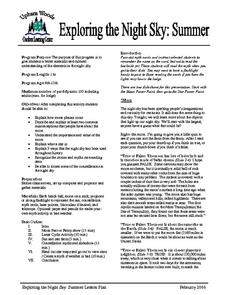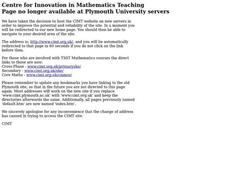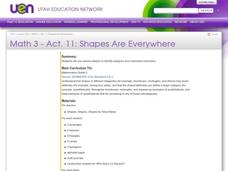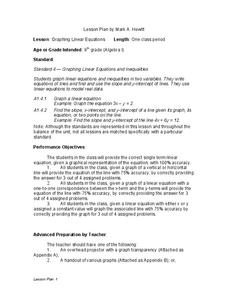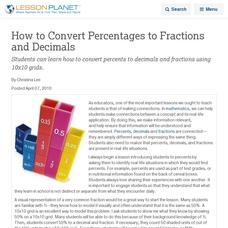Curated OER
Exploring the Night Sky: Summer
Students explain how moon phases occur. They describe and explain at least two common misconceptions that people have about the moon. Students explain what a star is. They explain 3 ways that the night sky has been used throughout history.
Curated OER
Government
Second graders run for various offices. They dress up like a politician, pretend to be running for an office, and tell the students why they should vote for him/her. They explain why it is necessary for a community to have a government
Curated OER
Invertebrates
Students examine invertebrates. In this animal classification lesson, students discuss invertebrates and bilateral symmetry. They discuss the importance of horse shoe crabs in medical science.
Curated OER
What's Your Angle?
Third graders read the story, Magic Schoolbus Inside the Human Body. Then they form right, acute, and obtuse angles using the joints inside their bodies. They write a brief summary about what they learned about angles as a review the...
Curated OER
Flower Dissection
Students dissect three different flowers and compare and contrast them. In this flowers lesson plan, students learn about the flower anatomy and then dissect their own flowers.
Curated OER
Percentages
For this percentages worksheet, 6th graders solve and complete 13 various types of problems. First, they convert the percentages to fractions and simplify. Then, students convert the percentages to decimals. In addition, they find the...
Curated OER
Animal Signs
Students discuss the many different types of animal signs that can be used to identify and track animals. They participate in an hands-on activity in which they examine tracks, trails, homes, territory markings, and even "scat" left by...
Curated OER
Equivalent Ratios
In this ratios worksheet, students complete a variety of online exercises involving writing twelve ratios in their simplest form, writing nine ratios in the form of 1:n, writing six ratios in the form n:1 and solving seven ratio word...
Curated OER
Jetta vs. Corvette
In this secondary mathematics worksheet, students must determine which of two cars arrives in Cincinnati first. The information about one car is given in terms of distance and information on the other is in terms of...
Curated OER
Codebreaker Math
Students solve addition and subtraction problems and decipher and write messages using a code. They read and discuss an informational fact sheet about the Navajo code talkers from World War II, and decode and re-code messages using math...
Curated OER
What Are Erosion and Sediments?
Students create experiments in class based on the erosion of Earth. For this erosion lesson, students perform a lab in class replicating the effects of erosion. Students finally draw their own conclusions based on the research performed.
Curated OER
Discovering Dichotomous Keys
Students become familiar with the structure and use of dichotomus keys. They demonstrate a comprehension of the fundamental principles of taxonomy by classifying organisms from a local ecosystem. Students are introduced to the term...
Curated OER
Identifying the Beat
Sixth graders listen to various songs. In this musical properties lesson, 6th graders work in groups to identify musical selections, practice tapping the beat, review time signatures, and identify the meter of different songs.
Curated OER
Simplifying Rational Expressions
In this rational expressions learning exercise, 9th graders identify and solve 20 different problems that include simplifying various types of rational expressions. First, they define and describe a rational expression and how to find...
Curated OER
Shapes Are Everywhere
Third graders use various shapes to identify polygons and understand symmetry. They explore pattern blocks noticing their similarities and differences, then share with other team members. They draw 3 polygons in their journals and...
Curated OER
Graphing Linear Equations
Ninth graders review the information that they have already learned
with regard to linear equations and graphical representations. They then assist in combining equations with a graphical element and complete various graphs with this...
Curated OER
Scavenger Hunt: A Group Collection
Students be complete a collection of living organisms and systems from the school campus.
Curated OER
Finding the Ages of Rocks and Fossils
High schoolers practice dating fossils. They learn the concept of "deep time"--that earth was formed billions of years ago. They experience excellent hand-outs and virtual age tutorial links.
Curated OER
Punnett Squares
Eighth graders take a short quiz on genotypes and phenotypes. As a class, they are introduced to the concept of Punnett Squares and listen to a description of Gregor Mendel's pea experiment. In groups, they complete Punnett Squares to...
Curated OER
Colorful Fractions
Students use charts to show fractions. In this fractions and percents instructional activity, students review fractions, percents and ratios. Students create tables and color the cells to make different fractions. ...
Curated OER
How to Convert Percentages to Fractions and Decimals
Students can learn how to convert percents to decimals and fractions using 10x10 grids.
Curated OER
Erosion: Natural or Unnatural
Students explore how water has the power to erode, how developing the land (building roads, buildings and parking lots) increases the amount of water reaching our rivers, and how this greater quantity of water increases erosion. They...
Curated OER
Basic Sense
Fifth graders add fractions. After a class discussion on real life application of fractions, the teacher uses fractions strips to model adding fractions. In pairs, 5th graders model adding fractions by drawing diagrams. They justify...
Curated OER
Cell-O
Students create model cells using gelatin, toothpicks, and various fruits to represent organelles. Then, students observe their models and complete a Venn Diagram comparing and contrasting plant and animal cells.
